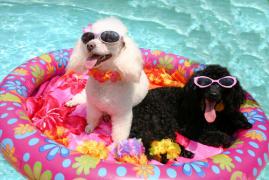Controlling Household Pests Safely When You Have Pets

Controlling Household Pests Safely When You Have Pets
 At one time or another, every home becomes infested with a household pest such as ants, cockroaches or rodents. Ridding your home of these noxious creatures can involve using equally noxious poisons which may not be safe for your pets. Here are some pest control treatments that do not involve poisons and are pet safe.
At one time or another, every home becomes infested with a household pest such as ants, cockroaches or rodents. Ridding your home of these noxious creatures can involve using equally noxious poisons which may not be safe for your pets. Here are some pest control treatments that do not involve poisons and are pet safe.
Talcum Powder
A mineral composed of magnesium silicate, talcum powder has been touted for the treatment of household ants. Shake talcum powder where your find ants and then once they are gone, vacuum up the residual powder. This method has the potential to get messy if your pets walk through the pile of powder on the floor, so keep them out of the treated area.
Building a Safer Mouse Trap
Controlling rodents can be downright dangerous for your pets. According to the Pet Poison Helpline, intoxication with rodent poison is number two on the list of dog poisonings and number 10 on the list for cats. Even though the labels indicate the refillable bait stations are dog proof, the manufacturers seem not to have met some of the more creative and persistent patients we see in New York City who are able to thwart the protective bait station, allowing them to feast on the contents. The most common type of rodent poison intoxication seen at the Animal Medical Center is life-threatening hemorrhage caused by anticoagulant rodenticides such as d-CON or Tomcat. Less common are rodent poisons that drive up the level of calcium in the body and cause kidney failure. Even glue traps can get stuck on a curious cat and require an animal ER visit for removal. Safest for pets would be the mechanical mouse traps which trap the mouse without any poison.
Keeping Mice Away
Of course, having no mice in your apartment would be better than having to set traps! I have steel wool around the openings in the floor where the heat pipes come into the radiators. The steel wool prevents mice from slipping through the hole and is not very chewable. Another pet safe mouse deterrent is peppermint oil. Apparently, mice don’t like the smell and it keeps them from coming into the apartment. Cotton balls soaked with peppermint oil from the health food store should be placed near the opening where the mice are entering. Part of me wonders if you could put the peppermint oil on the steel wool, but fortunately, I haven’t had reason to test this hypothesis.
Boric Acid
Often used as an antiseptic for minor burns and cuts, boric acid has also been approved for decades as an insecticide for cockroaches and ants. I found insecticide products containing boric acid on the shelf of my local drugstore. At first glance, boric acid seemed like a good choice for a pet safe insecticide, and although boric acid is used medicinally, the warning labels on the insecticide take boric acid off my list of pet safe insecticides. For minor cuts and burns, the boric acid crystals are diluted in water making the concentration very low. Based on the warning labels, I suspect because the concentration in the insecticide is much higher compared to the antiseptic solution.
Contact a Professional
If these simple pest control methods don’t work, consider engaging a professional pest control company and be sure to follow their directions regarding restricting your pet’s access to the treated areas in your home. You could also board your pets or have them spend the night at grandma’s house while your home gets treated.

































